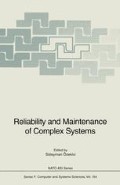Summary
Metal fatigue is a major cause for failure of mechanical and structural components. We review the fracture mechanics of fatigue and Paris-Erdogan law for the mean behavior. After a consideration of experimental data reported by Virkler et al. (1979), we propose a continuous semimarkov process to model crack growth. The model accounts for the material randomness and sees crack as a motion in a random field.
Access this chapter
Tax calculation will be finalised at checkout
Purchases are for personal use only
Preview
Unable to display preview. Download preview PDF.
References
Çinlar, E.: On Increasing Continuous Processes. Stoch. Proc. Their Appl. 9, 147154 (1979)
Çinlar, E.: On a Generalization of Gamma Processes. J. Appl. Prob. 17, 467–480 (1980)
Kogajew, V.H., Liebiedinskij, S.G.: Probabilistic Model of Fatigue Crack Growth (In Russian). Mashinoviedinije 4, 78–83 (1983)
Kozin, F., Bogdanov, J.L.: Recent Thought on Probabilistic Fatigue Crack Growth. Appl. Mech. Rev. 42, S121 — S127 (1989)
Naronha, P.J. et al.: Fastener Hole Quality, I and II. Tech. Report AFFDL-TR-78206, Wright-Patterson Air Force Base, Ohio (1978)
Ortiz, K., Kiremidjian, A.: Stochastic Modeling of Fatigue Crack Growth. Engng. Fracture Mechanics 29, 317–334 (1988)
Paris, P.C., Erdogan, F.: A Critical Analysis of Crack Propagation Laws. J. Basic Engng. 85, 528–534 (1963)
Sobczyk, K.: Modelling of Random Fatigue Crack Growth. Engng. Fracture Mechanics 24, 609–623 (1986)
Sobczyk, K., Spencer Jr., B.F.: Random Fatigue: From Data to Theory. Boston: Academic Press 1992
Sobczyk, K., Trebicki, J.: Modelling of Random Fatigue by Cumulative Jump Processes. Engng. Fracture Mechanics 34, 477–493 (1989)
Sobczyk, K., Trebicki, J.: Cumulative Jump-Correlated Model for Random Fatigue. Engng. Fracture Mechanics 40, 201–210 (1991)
Spencer Jr, B.F., Tang, J., Artley, M.E.: Stochastic Approach to Modeling Fatigue Crack Growth. AIAA Journal 27, 1628–1635 (1989)
Virkler, D.A., Hillberry, B.M., Goel, P.K.: The Statistical Nature of Fatigue Crack Propagation. J. Engng. Materials Tech. Trans. ASME 101, 148–153 (1979)
Author information
Authors and Affiliations
Editor information
Editors and Affiliations
Rights and permissions
Copyright information
© 1996 Springer-Verlag Berlin Heidelberg
About this paper
Cite this paper
Çinlar, E. (1996). Fatigue Crack Growth. In: Özekici, S. (eds) Reliability and Maintenance of Complex Systems. NATO ASI Series, vol 154. Springer, Berlin, Heidelberg. https://doi.org/10.1007/978-3-662-03274-9_2
Download citation
DOI: https://doi.org/10.1007/978-3-662-03274-9_2
Publisher Name: Springer, Berlin, Heidelberg
Print ISBN: 978-3-642-08250-4
Online ISBN: 978-3-662-03274-9
eBook Packages: Springer Book Archive

